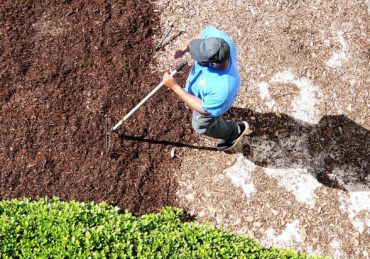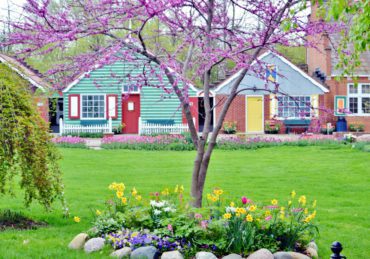Ever stood in your yard, staring at a bed that just won’t stay neat, either the mulch keeps blowing off or weeds keep punching through your rocks? We’ve been there. Choosing between mulch vs river rock isn’t just about how it looks. It’s about how your yard behaves, how much effort you want to put in later, and what kind of results you expect from your landscape.
Let’s break down the pros, cons, and real-world use cases of landscaping with river rock instead of mulch, without the fluff.

Mulch or River Rock? Depends on What You’re Dealing With
Say you’ve just planted new shrubs and want to give them a clean base. Or maybe you’re renovating a dry slope where bark chips keep floating away every time it rains. Those two jobs? Totally different solutions.
What mulch actually does
Mulch is ground-up organic matter, mostly wood chips or shredded bark. When laid 2 to 3 inches deep, it holds moisture, insulates roots, and slowly feeds your soil as it breaks down. That’s why gardens, flower beds, and vegetable plots thrive with it.
What river rock actually does
River rock is a long-term surface solution. It’s heavier, doesn’t break down, and helps with drainage. You’re not enriching soil with it, you’re keeping things in place, reducing runoff, or building a dry creek bed that won’t blow away in a storm.
Pro Tip: If your soil needs improvement or you’re planting anything with shallow roots (flowers, perennials, veggies), mulch is the better match. Rocks won’t help tired soil come back to life.
Curb Appeal Matters But Don’t Let Looks Fool You
Homeowners often choose river rock instead of mulch just because they like the crisp look. And yeah, a clean river stone edge against lawn is hard to beat visually. But it’s not always the right fit underneath.
Mulch gives a soft, earthy feel that blends into nature. It visually disappears in a way that highlights the plants instead of the ground. That’s why landscape beds around homes with heavy planting tend to use mulch.
River rock reads bolder. If your landscape is minimal, with clean lines and structure-heavy planting, rocks can complete the look.
Reality Check: You can always dress mulch beds with a stone border, but it’s harder to “soften” a full rock bed once it’s in. Know what aesthetic you’re committing to upfront.
You’ll Feel It in the Soil And So Will Your Plants
We once got a call from a homeowner who replaced mulch with river rock across all their planting beds. Six months later, the plants were struggling. Why? That beautiful bed of stone was cooking the soil underneath.
How mulch helps below the surface
Mulch regulates soil temperature, retains moisture, and adds organic matter over time. Especially in hot summers or cold winters, mulch gives plant roots a buffer. Davey Tree’s landscaping experts have noted that mulch can nearly double root development compared to bare or rocky soil.
What rocks do underground
Rocks don’t break down or nourish soil. In fact, darker rocks in full sun can spike ground temps by 10–20°F, putting stress on roots. Over time, the soil beneath compacted rock may even become hydrophobic or compacted, depending on drainage.
River Rock Costs More But There’s a Twist
We get a lot of cost questions, and here’s the honest rundown:
- Mulch costs less upfront (around $30–$45 per cubic yard installed).
- River rock costs more (commonly $80–$140 per cubic yard installed).
But mulch breaks down and usually needs refreshing every 1–2 years. River rock can last a decade or longer, assuming you don’t pull it out for a redesign. Angi’s landscaping cost breakdown backs this up with side-by-side comparisons over 5–10 years.
Note: If you’re planning to change your plant layout or move things around in a few years, skip the rock. You’ll hate digging through it.
River Rock Isn’t “Set It and Forget It”
We hear it all the time: “I want something low maintenance, so I’ll go with rock.” Fair. But know this, rocks do need work.
Leaves don’t magically disappear from stone beds. In fact, they stick. Debris collects in the gaps, and weeds will still sprout if your weed barrier isn’t perfect. According to Family Handyman’s mulch vs rock guide, river rock often demands more weeding than most homeowners expect.
You’ll likely need to blow out or vacuum debris a couple of times a season. And pulling weeds from rocks? It’s not fun.
Mulch beds, on the other hand, naturally hide leaf litter and are easier to clean with a rake or blower.
Slopes, Drainage, and Foundations: River Rock Shines Here
If you’re battling washouts on a slope or need to stabilize a drainage swale, landscaping with river rock instead of mulch is a smart move.
Mulch floats. Even the heaviest bark chips can slide downhill in a hard rain. River rock, especially angular or mixed-size stone, stays put. Around downspouts, it slows runoff. Along foundations, it prevents splash-back and potential rot issues near siding.
Warning: Never install rock directly against house siding without a breathable barrier or proper slope. It can trap moisture and cause long-term damage.
Plant Beds, Veggies, and Perennials? Stick with Mulch

If you’ve got garden beds with seasonal flowers, edibles, or new shrubs, don’t bury them in stone.
Roots want cool, moist, nutritious soil. Mulch helps deliver that. Plus, it suppresses weeds better when installed correctly and lets you rework the bed easily as plants grow or die back.
Stone beds can stress new transplants, especially in full sun. And planting into compacted soil under rock isn’t just hard, it’s less effective for long-term health.
High Traffic or Rental Property? River Rock Might Win

There’s a reason property managers lean toward rock in rental or commercial installs. Tenants won’t refresh mulch. Mowers might kick it into walkways. Foot traffic drags it around.
If you need a landscape that holds up without constant refreshes or re-edging, river rock can save your back. But only if you’re okay with a firmer, more structured look and occasional weed patrol.
What About Mixing Both?
You don’t have to pick just one.
We often design landscapes where mulch beds handle the planting zones and river rock defines pathways, borders, or tricky drainage spots. It’s not about choosing sides, it’s about putting each material where it works best.
Just don’t lay mulch over rock, or vice versa, thinking one will fix the problems of the other. That’s a recipe for mess.
Common Sense Answers to Tricky Questions
Can I swap mulch for river rock all around my house?
Yes, but you’ll lose soil benefits and possibly stress nearby plants. If you do it, be ready to manage heat, weeds, and extra watering.
Is rock fire-safe?
Yes. Unlike wood mulch, river rock won’t burn. That makes it a smart choice in fire-prone zones or near structures with wood siding.
Will I really save money with rock?
Not right away. But over 5–10 years, you may come out ahead on labor and material, assuming you’re not changing the layout or removing it later.
Go with What Works Not What Just Looks Good
If your yard is full of life, plants, beds, rotating blooms, mulch makes sense. It feeds the soil and supports growth. If you’re locking down structure, controlling erosion, or need clean lines with minimal fuss, river rock or mulch might not even be the right question. You might need both.
Choose based on what you’ll maintain, what your plants need, and how your yard behaves in storms, drought, or heat.
Most yards aren’t one-size-fits-all. Neither is your ground cover.




